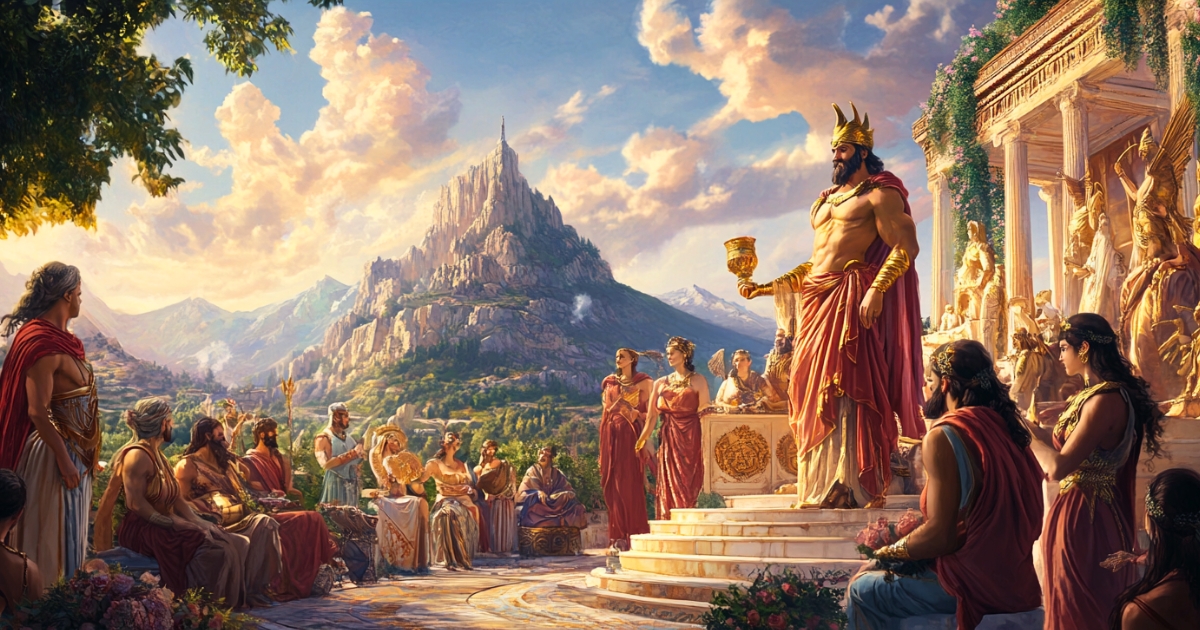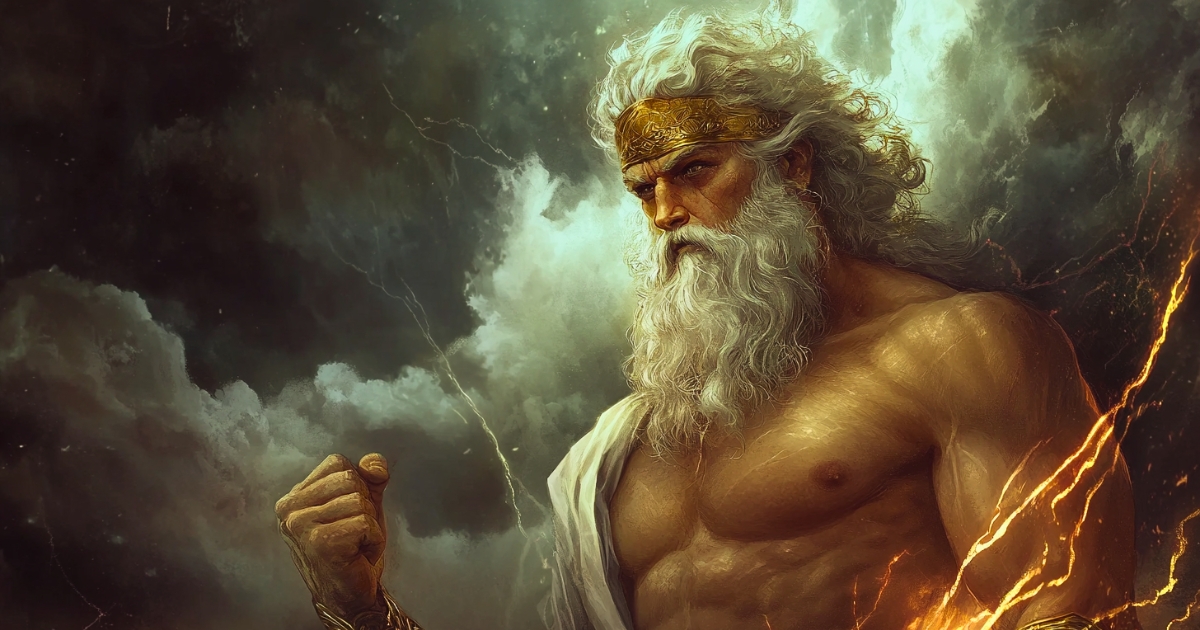Mythological Background of Zeus
Zeus, the most important figure in ancient Greek mythology, is known as the king of the twelve Olympian gods. Born to Cronus and Rhea, Zeus saved the other gods from his father’s tyranny and became the supreme deity reigning at the top of Mount Olympus.
Zeus is depicted as the god who rules over the sky and thunder, his power symbolizing the order of nature. Wielding lightning as his weapon and possessing the ability to control weather, Zeus was an object of awe and respect for ancient Greeks. His role as the king of gods was not merely a symbol of power but was also recognized as crucial in maintaining the harmony of the universe.
In Greek mythology, Zeus appears as the central character in many stories. His tales of love and battles vividly portrayed a world of gods in human form, stimulating the imagination of ancient Greeks. Zeus’s presence embodied both the forces of nature and the order of human society, influencing not only religious aspects but also greatly impacting art and literature.
The Power and Influence of Zeus

Zeus’s power is primarily manifested in his ability to control thunder and weather. His thunderbolt was the most powerful weapon against both gods and humans, simultaneously symbolizing his authority. This power was understood as the personification of nature’s awe-inspiring force, with ancient Greeks considering thunderstorms as expressions of Zeus’s anger.
Zeus’s influence over other gods was immense. Standing at the pinnacle of the twelve Olympian gods, he presided over the council of gods and held the authority to make important decisions. This power structure was reflected in ancient Greek social structures and political systems, with Zeus’s existence playing a role in justifying social order and hierarchy.
Zeus’s power to control weather had a significant impact on ancient Greek society, which primarily relied on agriculture. Good harvests and crop failures were believed to be the will of Zeus, and people prayed to him to bring appropriate rain at the right time. This belief played an important role in shaping the ancient Greek worldview that emphasized harmony between nature and human society.
Benefits Derived from Zeus
Faith in Zeus was believed to bring various benefits to ancient Greeks. By offering prayers to him, individuals and communities expected concrete benefits such as power, success, protection, and maintenance of order.
In terms of power, Zeus was believed to bestow not only physical strength but also mental fortitude and decisiveness. People sought Zeus’s blessing in situations requiring leadership or when facing difficulties.
Regarding success, Zeus was considered a being that brought success in various fields. People sought Zeus’s help in crucial moments such as business, war, and politics. Especially in important festivals like the Olympic games, there was a custom of offering prayers to Zeus for victory.
In terms of protection, Zeus was also revered as the guardian deity of travelers and guests. In ancient Greece, hospitality towards visitors from elsewhere was considered an important virtue, and this custom was believed to be under Zeus’s protection.
Concerning the maintenance of order, Zeus was worshipped as a being that protected social harmony and stability. Zeus’s presence was indispensable in maintaining basic social order, such as observance of laws and contracts, and the realization of fair trials.
Zeus’s Role as a Protector
Zeus was not merely a symbol of power but also played an important role as the guardian of law and order. In ancient Greek society, Zeus was the executor of justice and the guarantor of oaths and contracts.
Zeus’s role as the guardian of law was particularly prominent in important trials and political decisions. Judges and politicians sought Zeus’s wisdom and justice to make fair judgments. Also, when making important oaths or contracts, it was common to invoke Zeus’s name to ensure the sanctity of the promise.
Zeus was also central in ancient rituals and festivals. For example, the Olympic games began as a festival to honor Zeus, and participants took oaths before Zeus’s statue to ensure fair competition. Also, when forming treaties or alliances between city-states, oaths were exchanged in Zeus’s name, emphasizing the sanctity and inviolability of these promises.
Thus, as a symbolic figure protecting social order and justice, Zeus had a wide-ranging influence on ancient Greek life, from daily life to political scenes. His presence formed the spiritual foundation for maintaining the rule of law and social harmony.
Divine Union and Zeus

In Zeus’s mythological stories, his marriage to Hera holds particularly significant meaning. This divine union is depicted as symbolizing the order and harmony of the universe. Although the relationship between Zeus and Hera was not always peaceful, their bond was still considered essential in maintaining the stability of the universe.
Zeus also had relationships with other gods and sometimes humans, and these relationships were also considered to play important roles in maintaining cosmic order. For example, the story of Persephone, daughter of Zeus and Demeter, is interpreted as an explanation for the changing of seasons.
The significance of divine union went beyond personal relationships, symbolizing the harmony and order of the entire universe. The marriage of Zeus and Hera expressed the connection between heaven and earth, the harmony of masculinity and femininity, and the cycle of nature. This concept was deeply rooted in the worldview of ancient Greeks and influenced the stability and prosperity of society.
Maintaining divine union was considered important both on personal and social levels. The sanctity of marriage and the importance of family were emphasized based on the relationship between Zeus and Hera. At the same time, the harmony of society as a whole was seen as a reflection of this divine union.
Zeus-Human Unity Meditation
Even in modern society, there are attempts to utilize Zeus’s symbolic power. This is an imagination-based meditation that interprets Zeus’s mythical power in a modern context, aiming to apply it to personal growth and success.
The main purpose of this meditation is to incorporate elements symbolized by Zeus, such as power, success, protection, and maintenance of order, into one’s own life. Through meditation, participants aim to discover and strengthen qualities such as Zeus’s strength, decisiveness, and leadership within themselves.
Specifically, this meditation aims to bring the following benefits:
- Protection: Invoking Zeus’s protective aspect to enhance safety and stability in daily life.
- Power: Awakening inner strength and enhancing confidence and decisiveness.
- Success: Clarifying the path to achieving goals and strengthening motivation for success.
- Maintaining Order: Improving the ability to maintain harmony and order in life.
- Divine Union: Deepening relationships with others and connection with the universe.
To practice this meditation, start by sitting in a quiet place, closing your eyes, and imagining Zeus. Visualize Zeus’s strength, dignity, wisdom, and other qualities, and feel these qualities flowing into you. It can also be effective to use images of lightning and the sky to feel a rise in energy.
In the meditation, clarify your goals and desires, and intend to use Zeus’s power to realize them. You can also perform image training to evoke Zeus’s wisdom and power when facing challenges and difficulties in daily life.
Through the practice of Zeus meditation, participants are expected to rediscover their inner power and apply it to their daily lives. This meditation is gaining attention as an attempt to interpret ancient mythological wisdom in a modern context and connect it to personal growth and success.
Conclusion
The myth and influence of Zeus extend beyond ancient Greek society to the present day. As the ruler of the skies, Zeus has continued to stimulate people’s imagination as a symbol of power and order. His concepts of divine power and protection have influenced people across time, serving as a guide in pursuing personal growth and social harmony.
Zeus’s stories hold meaning beyond mere myth. They provide rich material for exploring universal themes such as the order of human society, harmony with nature, and the pursuit of individual power and success. The fact that there are attempts to utilize Zeus’s symbolic power in meditation and self-development in modern society shows that this ancient wisdom still holds relevance in our lives today.
Through Zeus’s myths, we can confront fundamental questions of life such as power and responsibility, order and freedom, and the relationship between individuals and society. And by reinterpreting this ancient wisdom in a modern context, we can find possibilities to enrich our own lives and society.


